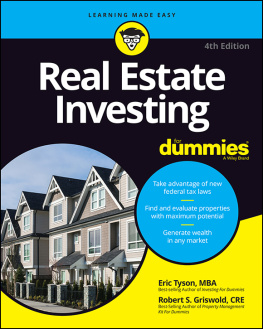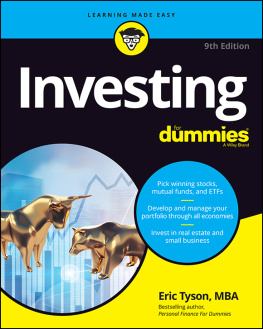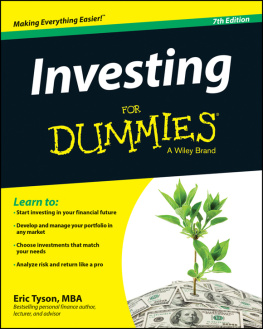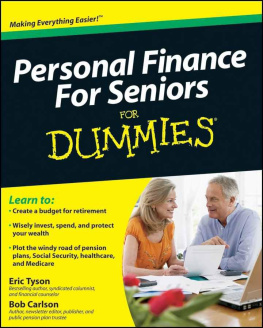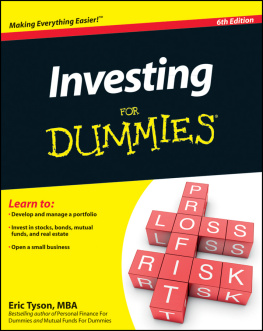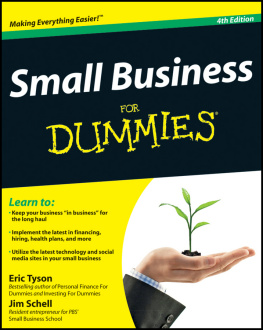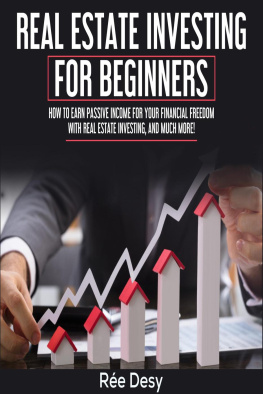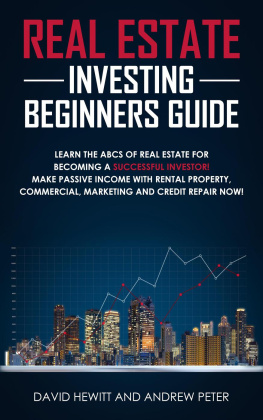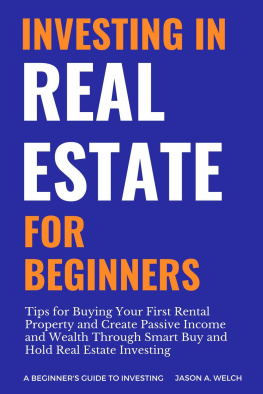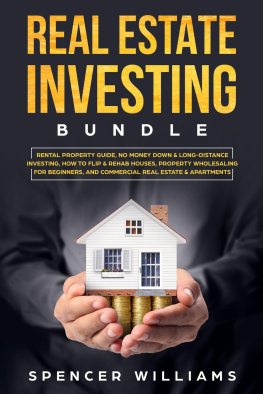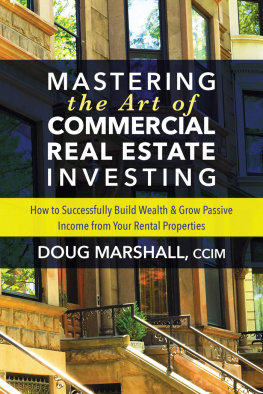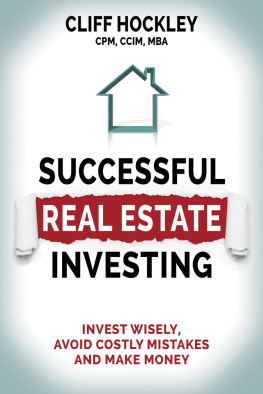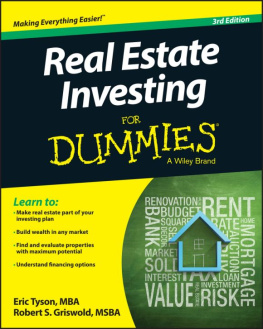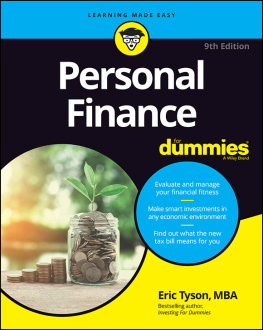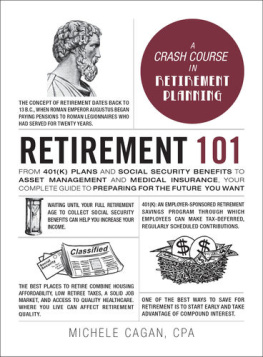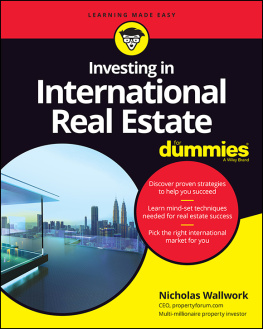
Eric and Roberts Principles for Success
by Eric Tyson and Robert S. Griswald
- Real estate is a proven wealth-building vehicle. Investing in rental properties can generate current income and significant tax benefits as well as build equity from appreciation over the years and decades.
- Although many people can succeed investing in real estate, rental property investing isnt for everyone. Consider your investment preferences and personal temperament before buying property. Do you have the time to devote to real estate investing? Are you comfortable troubleshooting problems or hiring a property manager?
- Make sure youre financially fit before investing in rental properties. Pay particular attention to your monthly budget and make sure that you have adequate insurance coverage. Most successful real estate investors build their real estate investment portfolio through saving money and then gradually buying properties over the years.
- Dont underestimate the importance of establishing good credit. The best returns on real estate rely upon the use of credit to obtain the leverage of using OPM (other peoples money).
- Your first (and often one of the best) real estate investment is buying a home to live in. Real estate is the only investment that we know of that you can live in or rent to produce income. You can also derive large tax-free profits when you sell your principal residence at a higher price than you paid for it.
- Focus on residential properties in the beginning. Residential property is an attractive investment and is easier to understand, purchase, and manage than most other types of property. If youre a homeowner, you already have experience locating, purchasing, and maintaining residential property.
- Among residential property options, our top recommendations are small apartment buildings and single-family homes. Attached housing makes more sense for investors who dont want to deal with building maintenance and security issues. Attached-housing prices tend to perform best in developed urban environments.
- Have your real estate team in place before you begin your serious property searching. Line up a real estate agent, loan officer, tax advisor, lawyer, and so on early because the real estate investor with the best resources can identify the properties to ignore and those worthy of careful consideration. Move quickly the speed at which you can close a transaction is an advantage in any type of market.
- Look for properties in the path of progress. Areas where new development or redevelopment is heading are where you want to be. The best real estate investment properties are ones that are well located and physically sound but cosmetically challenged and poorly managed.
- You dont get rich trying to find no-money-down real estate investment deals. Dont believe informercial hucksters. Dont expect to buy top-notch rental properties that way.
- Making at least a 20 to 25 percent down payment provides access to the best financing terms. You can make smaller down payments even as low as 10percent or less but you often pay a much higher interest rate, loan fees, and private mortgage insurance. Leverage, or the use of the lenders money to cover the majority of your acquisition costs, can boost your rates of return. But too much leverage can be dangerous if the rental market turns and your debt expenses are high.
- As the size and complexity of the deal increases, financing options become less attractive. The financing options for larger apartment buildings (five or more units), commercial, retail, industrial, and raw land generally require more money down and/or higher interest rates and loan fees. But more advanced real estate investors can enjoy higher overall returns plus the benefits of easier management and stability from long-term tenants.
- For low entry costs, consider real estate investment trusts (REITs) and lease options. You can buy these exchangetraded securities (which can also be bought through REIT focused mutual funds) for a thousand dollars or less. With lease options, you begin by renting a property you may be interested in purchasing later, and a portion of your monthly rent goes towards the future purchase. If you can find a seller willing to provide financing, you can keep your down payment to a minimum.
- We prefer the adage of Location, location, value. It clearly emphasizes location but also the importance of finding good value for your investment dollar. Owning real estate in up and coming areas with new development or renovated properties enhances finding and keeping good tenants and leads to greater returns. Properties in great locations with extensive deferred maintenance, especially aesthetic issues that can be inexpensively addressed are another great opportunity.
- Make real estate investments close by. Buy property within two hours away by your favorite mode of transportation. Venture further only when you really know another real estate market and regularly find yourself there for other reasons or youve found an excellent property manager.
- Any decision about where to invest starts with an evaluation of the overall regions economic trends. If the area isnt economically sound, then the likelihood for successful real estate investments are diminished.
- Youre purchasing a future income stream or cash flow when you buy an investment property. What you pay for a property and the cash flow it generates makes a significant difference in the success of your investment. The key is identifying which properties sellers have underpriced.
- Dont rely on the sellers numbers when evaluating a propertys potential. Speak directly with the seller to determine the history of the property and their motivation for selling. But, dont rely on historic operating results offered by the seller or broker. Develop your own numbers through evaluating the property with a team of qualified professionals who are specialists in the physical and fiscal management of real estate.
- The buy-and-flip real estate investment strategy can work, but it also has a downside. Buying and flipping can be a way to make quick money in real estate if you time your investments correctly in a rapidly rising real estate market. However, flipping can cause your profits to be taxed as ordinary income and you could lose during a market downturn.
- Bottom line: Real estate professionals, and you, should value a property based on the projected Net Operating Income (NOI). Project the NOI preferably for the next few years. Projecting the NOI is time consuming and requires a lot of experience, especially if you plan property changes to increase income and/or reduce expenses.
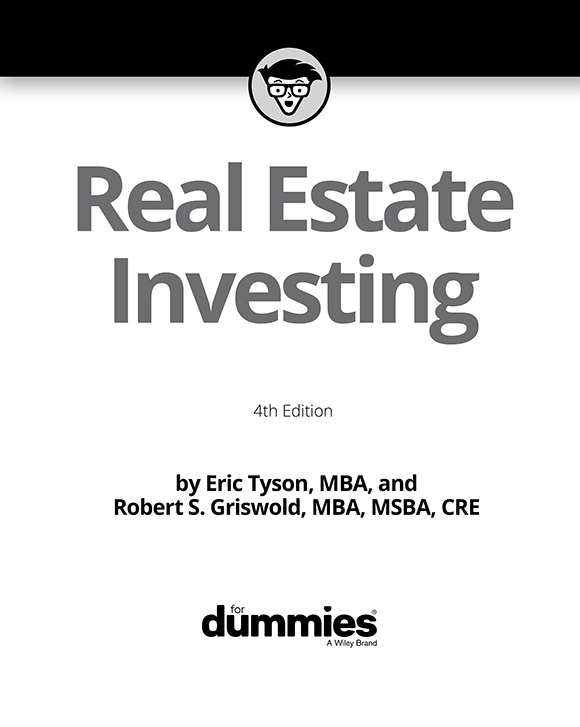
Real Estate Investing For Dummies, 4th Edition
Published by: John Wiley & Sons, Inc., 111 River Street, Hoboken, NJ 07030-5774, www.wiley.com
Copyright 2020 by Eric Tyson and Robert S. Griswold
Media and software compilation copyright 2020 by John Wiley & Sons, Inc. All rights reserved.
Published simultaneously in Canada
No part of this publication may be reproduced, stored in a retrieval system or transmitted in any form or by any means, electronic, mechanical, photocopying, recording, scanning or otherwise, except as permitted under Sections 107 or 108 of the 1976 United States Copyright Act, without the prior written permission of the Publisher. Requests to the Publisher for permission should be addressed to the Permissions Department, John Wiley & Sons, Inc., 111 River Street, Hoboken, NJ 07030, (201) 748-6011, fax (201) 748-6008, or online at
Next page
